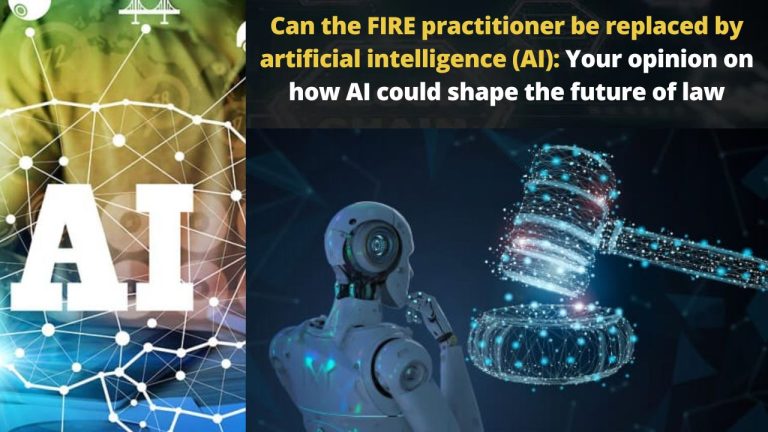"Advertisement"
Can the FIRE practitioner be replaced by artificial intelligence (AI): Your opinion on how AI could shape the future of law
Introduction
The incorporation of artificial intelligence (AI) into a variety of industries in recent years has spurred discussions about the possibility of automation and its effect on the labor market.
These discussions also apply to the legal profession, particularly to Financial Independence, Retire Early (FIRE) practitioners.
There is rising interest in whether AI could replace FIRE practitioners and change the course of law as it develops.
We shall examine the potential applications, constraints, and moral issues related to artificial intelligence (AI) in the legal industry in this article.
The Role of FIRE Practitioners
FIRE practitioners are professionals who offer wise counsel to those aiming for early retirement and financial independence.
Their knowledge includes things like risk management, tax preparation, investment techniques, and retirement planning.
To assist customers in navigating complex financial environments and achieving their retirement goals earlier than the customary retirement age, these professionals provide individualized counsel.
AI in the Legal Industry: Current State and Potential
Data analysis, contract evaluation, and legal research are the main areas where AI has already started to change the legal sector.
AI-powered systems can quickly go through enormous amounts of data and find pertinent case law and legal provisions.
This effectiveness lowers the possibility of human error while also saving time. Additionally, AI systems can spot trends that human practitioners might not instantly see, improving the quality of legal arguments.
The Potential Impact on FIRE Practitioners
The question of whether AI can completely replace FIRE practitioners still exists, despite the impressiveness of its existing powers.
The solution is intricate. Many of the analytical operations now carried out by FIRE practitioners, such as data analysis, portfolio optimization, and even some retirement planning duties, may undoubtedly be handled by AI.
Massive datasets can be processed by AI algorithms, which can then produce suggestions based on current and past market trends.
A FIRE practitioner’s responsibilities go beyond data analysis, though. They spend a lot of time getting to know their clients, learning about their specific financial objectives, and giving them individualized counsel.
This human element, which is characterized by empathy, emotional intelligence, and the capacity to understand unique situations, is difficult for AI to accurately mimic.
The Synergy Between AI and FIRE Practitioners
The likelihood of an AI and FIRE practitioner collaboration is higher than a total replacement. AI can be an effective tool that enables FIRE practitioners to swiftly acquire accurate and current information.
Professionals can spend more time developing client connections and providing strategic insights that call for in-depth expertise by automating repetitive chores.
Ethical Considerations
There are ethical issues with AI integration in the legal field that need to be addressed. The potential bias in AI algorithms is one such issue.
AI may reinforce discriminatory behaviors if it is taught on skewed historical data. While promoting fair and equitable financial advice, FIRE practitioners are equipped to recognize and navigate these prejudices.
In addition, the subject of responsibility is raised. Who is accountable if and when AI makes mistakes? In order to secure accurate and trustworthy results, it is essential to strike a balance between AI aid and human control.
Conclusion
It is doubtful that AI will completely replace FIRE practitioners in the changing legal and AI world. Instead, the future of the legal profession is likely to be shaped by the convergence of human expertise and AI capabilities.
In order to improve their analytical skills and keep their attention on the individualized, human-centric components of their work, FIRE practitioners might make u
se of AI tools.
A FIRE practitioner’s job description may change as technology develops. Professionals in this profession must adapt and learn complementary skills including sophisticated data analysis,
Comprehending recommendations produced by AI, and upholding high ethical standards in an AI-augmented environment.
FIRE practitioners may maintain their position at the vanguard of an industry that is going through a disruptive technological wave by adopting AI as a tool for empowerment rather than competition.
Finally, Thanks For Reading “Can the FIRE practitioner be replaced by Artificial intelligence (AI): Your opinion on how AI could shape the future of law“.
Must Read:
Essay On Global South and India
